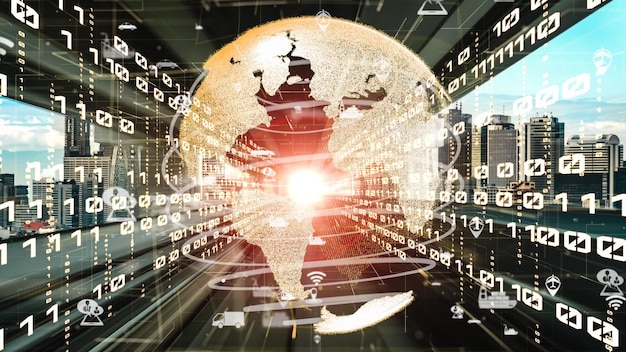Social Media’s Impact on Politics: Misinformation & Polarization

The Impact of Social Media on Politics: Misinformation and Polarization examines how platforms amplify misinformation, contribute to political division, and influence public opinion, particularly in the US context.
The digital age has transformed the way we engage with information and each other, yet the rise of social media has had a particularly profound and complex impact on the political landscape. This article delves into the impact of social media on politics: misinformation and polarization within the United States, exploring how these platforms have become both a powerful tool for political mobilization and a breeding ground for misinformation and division.
Social Media’s Role in Shaping Political Discourse
Social media platforms have become integral to political discourse in the 21st century. They provide politicians and citizens alike with unprecedented opportunities to disseminate information, mobilize support, and engage in public debate. However, this increased accessibility also comes with its own set of challenges.
The Democratization of Information
Social media has undeniably democratized information, allowing a wider range of voices to participate in political conversations. Individuals and grassroots movements can bypass traditional media outlets and directly communicate with the public.
Amplifying Marginalized Voices
These platforms have also provided a space for marginalized voices to be heard, enabling minority groups and activists to organize and advocate for their rights.
- Social media platforms offer opportunities to challenge established power structures.
- Online activism can quickly gain momentum and attract global attention.
- Citizen journalism can provide alternative perspectives on political events.
Despite these benefits, the ease with which information can be shared online also presents significant risks. The lack of editorial oversight and the prevalence of algorithms that prioritize engagement can lead to the spread of misinformation and the exacerbation of political polarization. The next sections will explore these challenges in greater detail.

The Spread of Misinformation and Fake News
One of the most concerning aspects of social media’s impact on politics is the rampant spread of misinformation and fake news. The speed and reach of these platforms make them ideal vectors for disseminating false or misleading information, often with malicious intent.
How Misinformation Spreads
Misinformation can spread rapidly through social networks, often amplified by bots and coordinated disinformation campaigns. The emotional nature of political content can also encourage users to share information without verifying its accuracy.
The Role of Bots and Trolls
Automated bots and troll farms play a significant role in spreading misinformation, often targeting specific demographics or exploiting social divisions. Understanding these factors is vital for individuals aiming to recognize reliable information.
- Bots can create the illusion of widespread support for a particular viewpoint.
- Trolls often engage in harassment and intimidation to silence dissenting voices.
- Foreign actors may use social media to interfere in domestic political processes.
The consequences of misinformation can be severe, eroding trust in institutions, influencing election outcomes, and inciting violence. Addressing this challenge requires a multi-faceted approach involving media literacy education, platform accountability, and fact-checking initiatives.
Political Polarization and Echo Chambers
In addition to spreading misinformation, social media has also been shown to exacerbate political polarization and create echo chambers. These echo chambers reinforce existing beliefs and limit exposure to diverse perspectives, further dividing society.
The Formation of Echo Chambers
Social media algorithms often prioritize content that aligns with a user’s existing beliefs, creating personalized filter bubbles that reinforce their worldview. This can lead to increased political polarization, as individuals become more entrenched in their own opinions. Exposure to diverse opinions plays a crutial role in informed decision-making.
The Impact on Political Discourse
The creation of echo chambers can also lead to more intense political animosity and a decline in civil discourse. When individuals are only exposed to like-minded opinions, they may become more intolerant of opposing viewpoints.
- Echo chambers can lead to a lack of empathy and understanding for opposing viewpoints.
- Social media algorithms can inadvertently promote extreme or inflammatory content.
- The anonymity of online interactions can embolden aggressive or hateful behavior.
Breaking down these echo chambers requires active effort from individuals and platforms alike. Encouraging exposure to diverse perspectives, promoting critical thinking skills, and fostering online empathy can all help to bridge the political divide.
The Influence of Social Media on Elections
One of the most tangible impacts of social media on politics can be seen in its influence on elections. These platforms have become powerful tools for campaigning, voter mobilization, and shaping public opinion during election cycles.
Campaigning and Voter Mobilization
Social media allows candidates to directly engage with voters, bypassing traditional media outlets and tailoring their messages to specific demographics. This can be particularly effective for reaching young or marginalized voters who may not be as engaged with traditional political processes.
Shaping Public Opinion
Social media can also be used to shape public opinion through targeted advertising, viral content, and influencer marketing. However, these techniques can also be used to spread misinformation or manipulate voters.
- Social media advertising can be highly effective in persuading undecided voters.
- Viral content can quickly spread a candidate’s message to a wide audience.
- Influencer marketing can be used to reach specific demographics or communities.
The influence of social media on elections raises important questions about the integrity of the democratic process. Ensuring fair and transparent elections in the digital age requires addressing issues such as misinformation, foreign interference, and voter suppression.

Social Media Regulation and Responsibility
Given the significant impact of social media on politics, there is a growing debate about the need for regulation and the responsibilities of platforms. Finding the right balance between protecting free speech and addressing the harms of misinformation and polarization is a complex challenge.
The Debate over Regulation
Some argue that social media platforms should be regulated as publishers, holding them accountable for the content that is shared on their sites. Others argue that such regulation could stifle free speech and innovation.
Platform Accountability
Regardless of whether formal regulations are implemented, there is a growing consensus that social media platforms have a responsibility to address the harms that occur on their sites. This includes taking steps to combat misinformation, reduce polarization, and protect users from harassment and abuse.
- Social media platforms could invest more in fact-checking and content moderation.
- Algorithms could be designed to prioritize accurate information and diverse perspectives.
- Platforms could implement stricter policies to combat harassment and abuse.
Ultimately, addressing the challenges posed by social media’s impact on politics requires a collaborative effort involving governments, platforms, civil society organizations, and individual users. By working together, we can create a more informed, engaged, and democratic online environment.
Strategies for Navigating the Digital Landscape
In an era dominated by social media, it is essential for individuals to develop strategies for navigating the digital landscape responsibly. This involves cultivating critical thinking skills, seeking out diverse perspectives, and engaging in constructive dialogue.
Cultivating Critical Thinking Skills
One of the most important skills for navigating the digital landscape is critical thinking. This involves questioning the information you encounter, verifying its accuracy, and considering multiple perspectives before forming an opinion. The ability to differentiate reliable sources from unreliable ones is crucial in media literacy.
Seeking Out Diverse Perspectives
Another important strategy is to seek out diverse perspectives and avoid becoming trapped in echo chambers. This means actively searching for information from a variety of sources, engaging with people who hold different viewpoints, and challenging your own assumptions.
- Follow diverse news sources and political commentators on social media.
- Participate in online discussions and forums with people who hold different viewpoints.
- Challenge your own assumptions and be open to changing your mind.
By cultivating critical thinking skills and seeking out diverse perspectives, we can all become more informed and engaged citizens in the digital age. Embracing civil dialogue and respectful disagreement are key to a healthy democracy.
| Key Topic | Brief Description |
|---|---|
| 📢 Misinformation Spread | Social media platforms facilitate rapid dissemination of false information. |
| 🔒 Echo Chambers | Algorithms reinforce existing beliefs, limiting exposure to diverse views and increasing polarization. |
| 🗳️ Election Influence | Social media impacts elections through campaigning, mobilization, and shaping public opinion. |
| ⚖️ Regulation Debate | Debate surrounds regulating social media to balance free speech with harms of misinformation. |
Frequently Asked Questions
▼
Social media algorithms create echo chambers by prioritizing content that aligns with users’ existing beliefs. This reduces exposure to diverse perspectives, leading to increased polarization as individuals become more entrenched in their opinions.
▼
Bots and trolls are often used to spread misinformation by creating the illusion of widespread support for a particular viewpoint or engaging in harassment/intimidation to silence dissenting voices, further distorting public discourse.
▼
To identify misinformation, check the source’s credibility, look for supporting evidence from multiple reliable sources, be wary of emotionally charged content, and consult fact-checking websites to verify the information’s accuracy.
▼
Breaking out of echo chambers involves actively seeking out diverse perspectives, following people with different viewpoints, engaging in constructive dialogue, and challenging your own assumptions to foster a more informed worldview.
▼
Social media platforms have a responsibility to combat misinformation by investing in fact-checking, content moderation, designing algorithms that prioritize accurate information, and implementing stricter policies against harassment and abuse to promote a healthier online environment.
Conclusion
In conclusion, the confluence of social media and politics presents both unparalleled opportunities and daunting challenges. While these platforms have democratized information and amplified marginalized voices, they have also become conduits for misinformation and fuels for polarization. Navigating this complex landscape requires critical thinking, media literacy, and a commitment to seeking out diverse perspectives. As individuals and as a society, we must actively engage in fostering a more informed, engaged, and democratic online environment to safeguard the integrity of our political processes.





